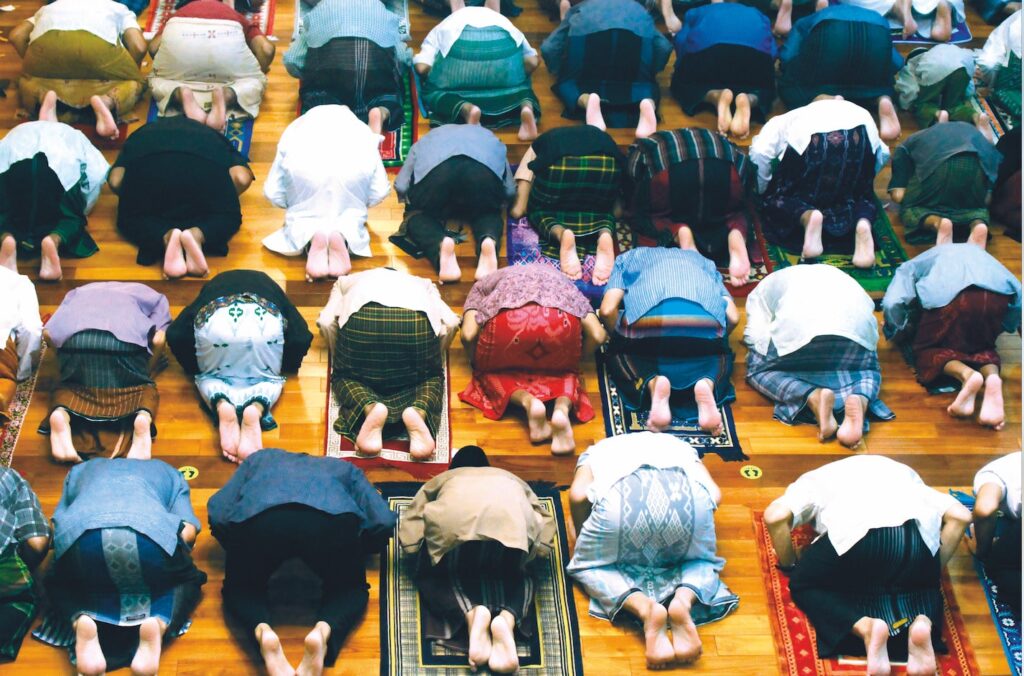
In 2025, the holy month of Ramadan will take place from 1 to 30 March, followed by the holiday season of Eid al-Fitr, better known as Lebaran here in Indonesia. Home to the largest Muslim population in the world, these are important religious observations for the majority of the country, where ritual fasting, communal fast-breaking, special prayers at mosque and family gatherings will certainly take place throughout the month.
Below are some of the traditions one will see that define this holy season for Muslims across Indonesia, and indeed the world in some cases.

Sahur
An early meal consumed before dawn prayers, vital for ensuring the body is given the nutrition and energy before a full day of fasting. To wake up observers, neighbourhood mosques will make the morning call, and even groups of young devotees will walk around areas beating drums, yelling ‘Sahur…! Sahur…!’ This in itself creates a communal and spirited atmosphere.
Takjil
Comes from Arabic ‘ajila’ meaning to hasten. Hence, this word refers to the command to break the fast immediately. Interestingly, many Indonesians use ‘takjil’ to describe light snacks or sweet treats consumed to break the fast, these range from sweet snacks and fried foods.
Bukber
An Indonesian portmanteau for ‘buka bersama’, or the tradition of opening fast together as a group. These are normally organised by groups of friends, families, or even companies to enjoy the fast-breaking moment altogether.

Tarawih
Every evening during Ramadan, Muslims gather in neighbourhood mosques for tarawih, congregational prayers held around 7:30 PM. While not obligatory, these prayers are highly encouraged and widely attended, creating a sense of community and spiritual devotion.
Mudik
The term for the exodus of millions of people from the urban centres to the villages in order to celebrate the Eid al-Fitr holiday with parents, family, and friends in the village. This is a strongly held tradition, and travellers happily endure a lot of hardships and inconvenience in overcrowded buses, trains, boats as well as the possibility of seasonally inflated transportation prices.
Takbiran
On the last night of Ramadan, Muslims come together in mosques and recite takbir. It is done with a parade carrying lanterns or torches and the beating of the bedug (traditional drum) saying “Allahu Akbar, Allahu Akbar, Allahu Akbar, La Ilaha Illallah, Allahu Akbar, Allahu Akbar wa Lillahil-hamd.”

Ketupat
Indonesian rice cakes are widely enjoyed during Eid al-Fitr. Made with young coconut frond leaves, woven into diamonds and filled with uncooked rice and boiled for 4 to 5 hours. Ketupat is typically served with various accompanying foods, such as opor ayam (a savory chicken stew), rendang (spicy, slow-cooked beef), and sayur sambal godog (spicy vegetable dish) which all those dishes cooked in coconut milk. This is the classic ‘Lebaran’ festive feast.
Halal Bihalal
This is the post-Ramadan gathering whereby people visit one-another to ask for forgiveness and indeed to forgive others. It is usually held during the month of Shawwal, the 10th month of the lunar based Islamic calendar by various government and non-government offices, schools, organisations, housing complex etc. Although the name sounds Arabic, it’s not an Arabic term, so it does not have a clear meaning. This tradition can’t be separated from the moment of Eid.
THR
Short for Tunjangan Hari Raya or holiday allowance. The tradition of giving THR is a very embedded part of the labor culture in Indonesia, especially before religious holidays such as Eid al-Fitr. This allowance is given to workers to help them meet their holiday needs. In addition to formal THR, there is also a tradition of giving angpao (small envelopes filled with new money) to children. Parents, relatives, or family members with income typically participate in this custom. It’s common to hear excited children during Eid exclaim, “Bagi THR/angpao dong!” (Share with me your THR or money gift!).






